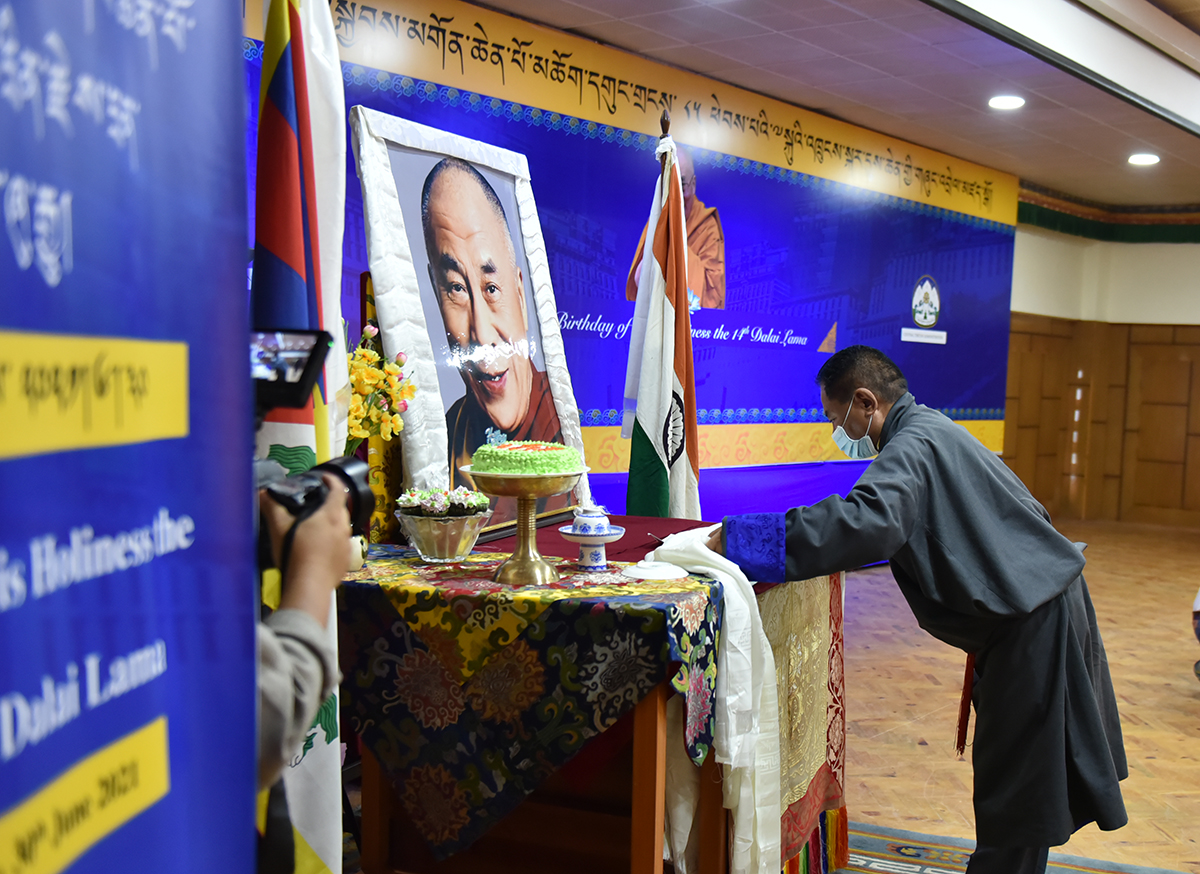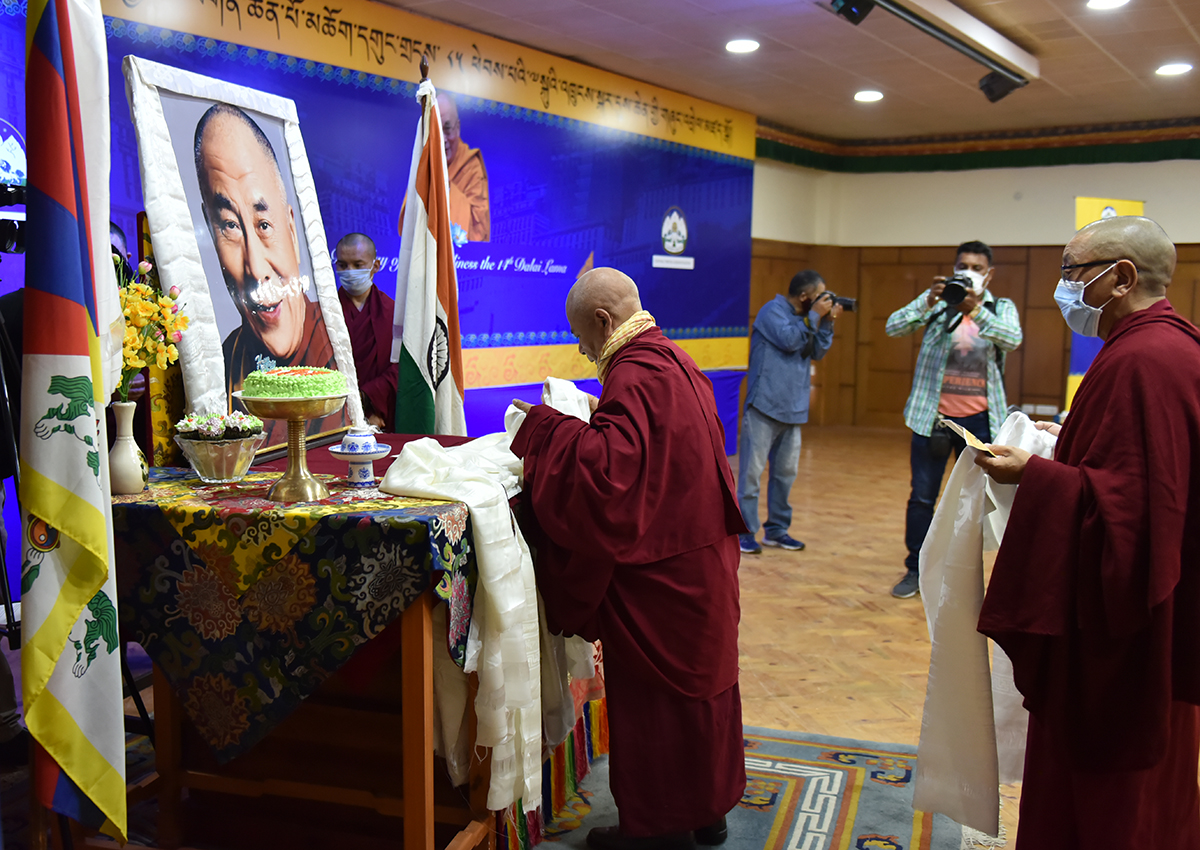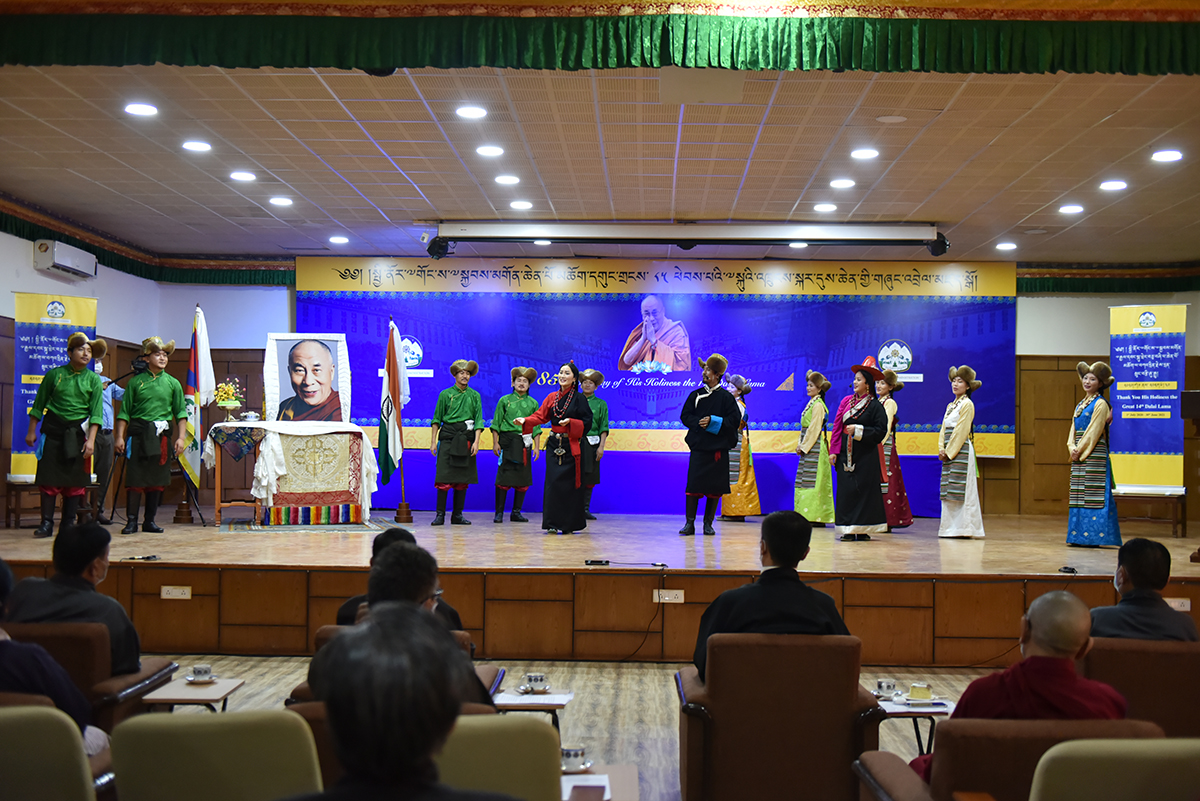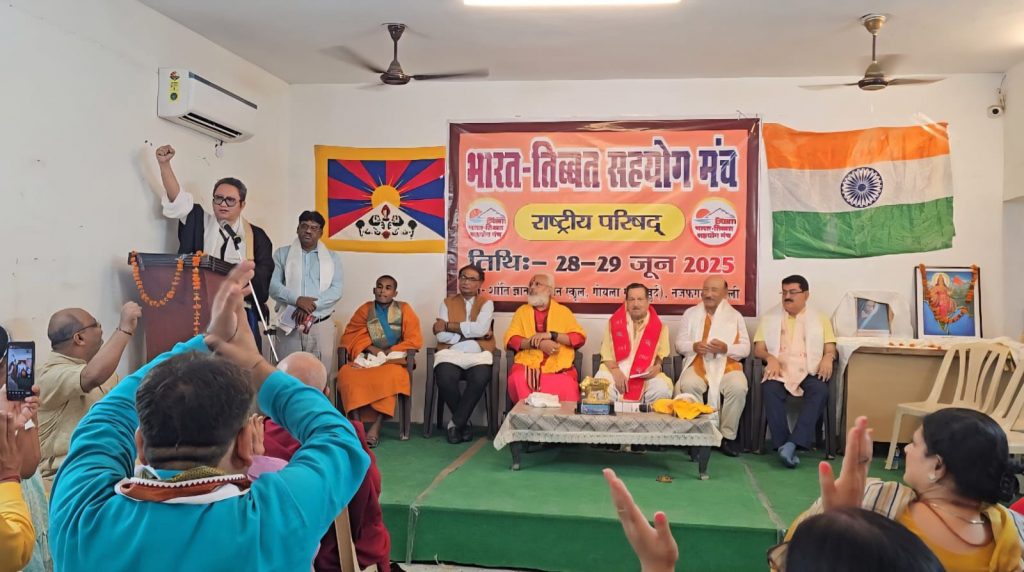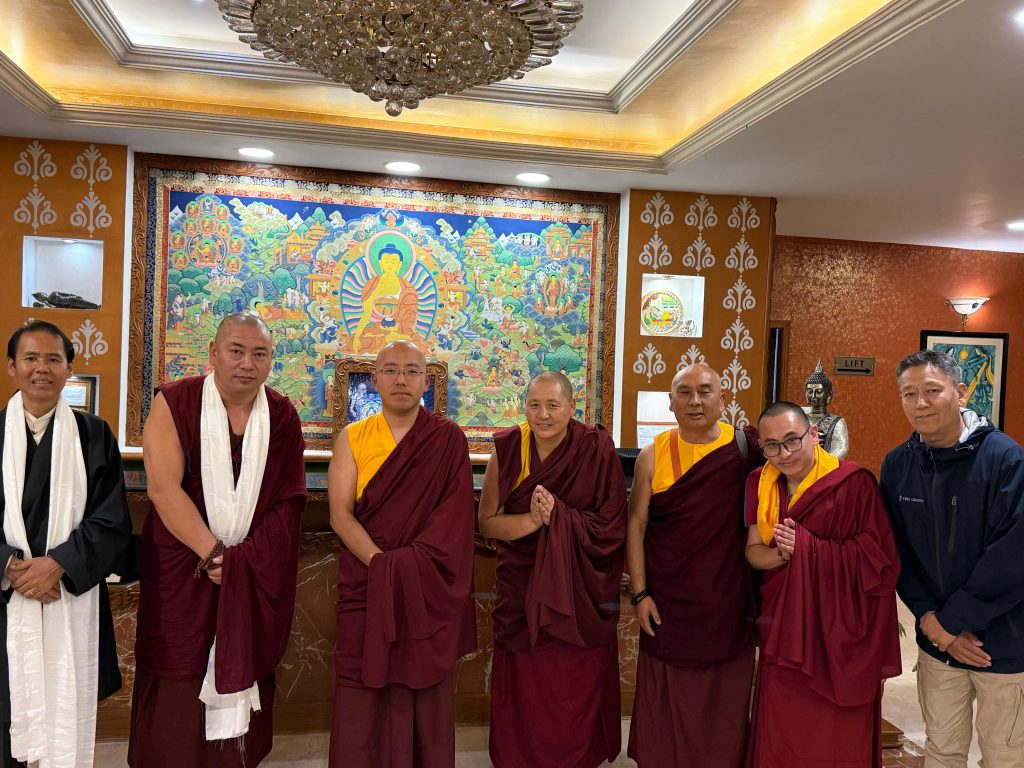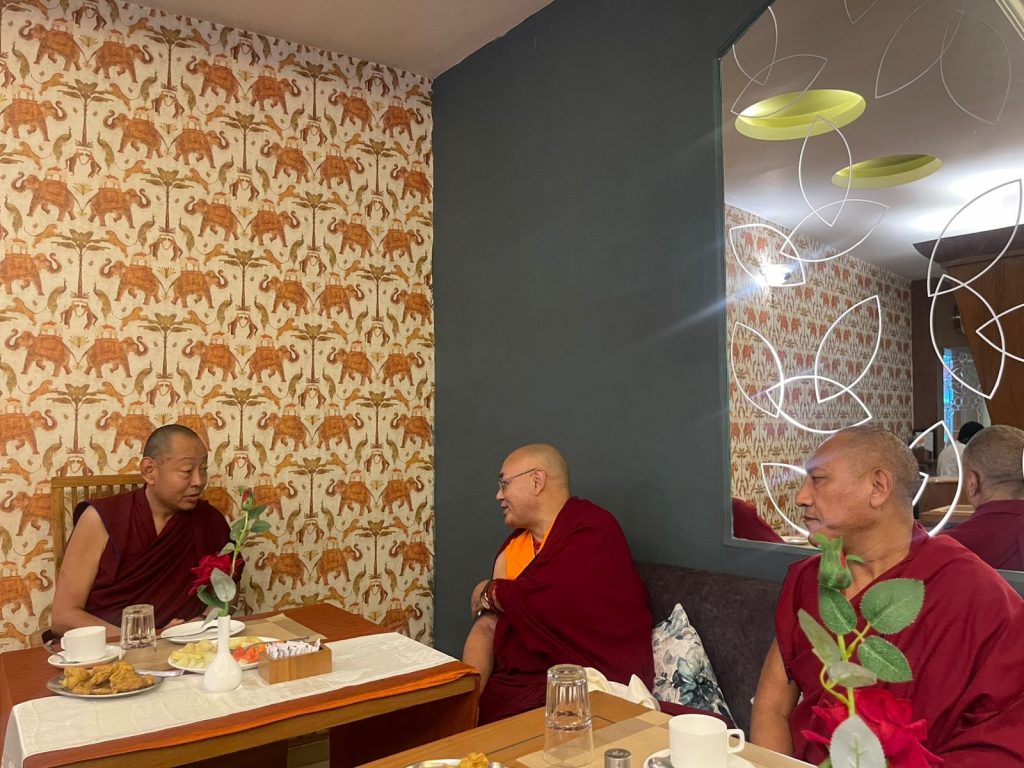
Speaker Pema Jungney of the 16th Tibetan Parliament-in-Exile
Today, the 16th day of the 5th month of the Tibetan Royal Year 2147, falling in the 17th sexantry of the Tibetan Royal Year calendar system, which corresponds to the 6th day of July, is an especially important day of great auspiciousness. It marks the day on which His Holiness the Great 14th Dalai Lama, the protector and refuge, bar none, of all sentient beings that include the Gods in the heavens; the master of the corpus of all the Buddhist learning on this earth; the destined deity of all sentient beings of the Snowland of Tibet; the miracle emanation in human form of the most exalted lotus-holding Bodhisattva who exemplifies the greatness of a Buddhist monk persevering in steadfast observance of all his vows as such; the one who bears great affection for all sentient beings irrespective of the absence of any prior acquaintance with them; a great champion of world peace; and the unsurpassable leader and guiding light of all subjects of Tibet whose full name, for the sake of formality, is Jetsun Jampal Ngawang Lobsang Yeshe Tenzin Gyatso Sisum Wanggyur Tsungpa Mepey-de Pel-Sangpo; and the spiritual lord of the three realms attains the age of 86 by Tibetan tradition, and 85 by the universal calendar system. On this day of perfect bliss, we, on behalf of all Tibetans in Tibet and in exile, offer greetings with unshakable devotion of body, speech, and mind to His Holiness the Dalai Lama repeated a countless times and, along with it, offer fervent prayers that His Holiness may live for a hundred aeons so as to provide us with great kindness the nectar-like teachings of clairvoyant guidance which is akin to the continuity of a summer stream at all times.
Let me begin by offering our congratulations to everyone here for the fortunate opportunity we all have received once again to celebrate the birthday of His Holiness the Dalai Lama. Inasmuch as they are monumental, the greatness of the noble deeds of His Holiness the Dalai Lama defies description or enumeration. Nevertheless, seizing this moment as an opportunity for accumulating a share of merits, let me present a gist of these with greatest of brevity here. His Holiness the 14th Dalai Lama was born on the 5th day of the 5th Tibetan month of the Wood-Hog Year in the 16th Tibetan Royal Sexantry, which corresponded to the 6th day of July in the universal year 1935, in Tagtser Village of Domey Kumbum, a territorial jurisdiction of the Tibetan nation at that time, to parents with excellence of ancestry. The birth was accompanied by the appearances of awesome harbingers of most auspicious of omens. Upon reaching the age of two, He, by the advice and prophesies of Gods and lamas under the power of the kindness of his predecessor reincarnation, was recognized as the reincarnation of His Holiness the 13th Dalai Lama without any space for error. Thereafter in 1939, His Holiness the Dalai Lama was escorted to Lhasa, the capital of Tibet. On the 14th day of the first month in the Tibetan Iron-Dragon Year, which corresponded to the 22nd day of February in 1940, His Holiness was ushered to the height of the Golden Throne that was held aloft by the fearless quintuplet of snow lions in the second of the fabled celestial palace of the Potala that was located in the Lhasa city. Enthroned thus, His Holiness fluttered the banner of auspiciousness in all directions while immersing himself in the study of the career biographies of the great spiritual beings of the past. Along with it, His Holiness, brushing aside all difficulties that came his way, completed his study of the corpus of the Buddhist texts both general and specials. It all culminated in His Holiness the Dalai Lama appearing for his public dialectic debates at all the three great monastic seats of learning as well as at the Great Prayer Festival before mass gatherings of monks which paved the way for his honoring of the Geshe Lharampa degree, thus His Holiness became the crown ornament of all the learned masters of the Snowland of Tibet.
In 1949, communist ruled China began its armed invasion of Tibet from the east. Following it, the political situation in Tibet kept deteriorating fast, like the inevitability of the depletion of the fuel of butter in a continuously burning butter lamp. And it became starkly obvious that it was His Holiness the Dalai Lama, and no one else, who had the power and capability to steer the course of the Tibetan nation’s religious and political affairs at that very critical moment. All beings of the Snowland of Tibet, the divine as well as the humans, were spontaneous in their unanimous understanding to single-pointedly pray to Him with great fervidness to assume the leadership. And so it came about that even though he was only 16 years old at that time, His Holiness, true to the solidness of his kindness-driven oath to carry forward the work of his successive predecessors, assumed the leadership of Tibet in fields both temporal and spiritual, the twin sources of wellbeing and happiness to the Tibetan people, on the 17th day of November in 1950. And His Holiness began issuing clear and vivid royal edits and directives of forcefulness and majesty towards his subjects in all the three provinces. Since then, he employed miracle as well as wisdom with great dexterity in keeping with the requirements of times and circumstances in getting on with all the communist Chinese occupiers in Tibet, be they people in the military or civilian sections, whether as leaders or subordinates, with the underlying motivation of great kindness for everyone. He adopted broadmindedness and fortitude when the Chinese government acted with brutality and violence, relying only on the non-violent method that ensured no harm to the other side. In that way, His Holiness strove to resolve the Sino-Tibetan dispute by continuing to deal with the Chinese in the manner of “coddling the fire, being burned by the fire.” In that way His Holiness made efforts to save his people from an otherwise imminent massacre and bloodshed for nine long years.
Nevertheless, there was no let up at all in the government of China’s plotting and war preparations, as well as its deceptions. In addition, there was no end to its continued subterfuge which threatened nothing less than the personal safety of His Holiness the Dalai Lama. In fact, it was on account of the danger to the personal safety of His Holiness the Dalai Lama posed by the Chinese machination that on the 10th day of March in 1959, the Tibetan people rose to oppose the government of China by organizing an uprising as they found no other alternative means to avert the danger. After that the situation in Tibet became even more critical and dangerous, with the result that it became inevitable for His Holiness the Dalai Lama to leave Norbu Lingkha Palace in the night of the 17th of March 1959 to escape towards the holy land of India.
When He safely reached India on the 31st day of March in 1959, His Holiness the Dalai Lama was only 24 years old. Even so, He took to care for His people like a parent would his children. Not long after setting foot on India, many tens of thousands of Tibetan people, having opted to look up with hope to none but Him, followed His Holiness into exile. Which included monastics as well as laypeople, young and old from all the three provinces of Tibet. His Holiness ensured for them the breath of a life of safety, free from all fears. He ensured that they did not suffer from deprivations of basic existential needs of food, clothing and shelter. And then with the aim to rekindle the Tibetan people’s religious culture, His Holiness helped to re-establish in exile centres where each of the four major schools of Tibetan Buddhism and the Yungdrung Bon followers could study and practice Tibetans’ unique traditions and customs in their own ways and thereby ensured their revival and perpetuation. In particular, settlements, educational centres, handicraft centres, business enterprises, and fund-raising initiatives were established under the leadership of a democratic administration with unexceptionable guidance, bearing in mind the aim of ensuring the future and wellbeing of the religious heritage and national identity of the Snowland of Tibet. Our gratitude for the limitless expanse and endless continuity of His Holiness the Dalai Lama’s noble deeds directed at the preservation and revival, as the case may be, of our precious religious and cultural heritage as well as our language, customs, and traditions can never be expressed enough in words.
Regarding the mutually beneficial Middle Way Policy being currently pursued as an effort to resolve the issue of Tibet, His Holiness the Dalai Lama outlined the rudiments of a policy decision back in 1974 not to seek restoration of the independence of Tibet, should an opportunity for dialogue with the government of China arise in the near future. And in 1979, China’s then paramount leader Deng Xiaoping proposed that except for independence, everything concerning Tibet could be discussed and resolved. Since then, His Holiness delegated successive envoys to hold dialogue with the government of China. On the 18th of September in 1997, the Tibetan Parliament-in-Exile unanimously adopted the Middle Way Approach, which since then became a policy of utmost merits of the Central Tibetan Administration. Including from many governments, the policy has received maximum possible support from many entities both public and private as well as individuals from across the world. Apart from that, the policy continues to receive loving embrace and support from many intellectuals in China itself. Developments such as these are the result of the decision taken by His Holiness giving the primary consideration to the resolution of the issue of Tibet on the basis of making a realistic appraisal of and adapting to the current situation.
Relying primarily on the power of compassion, His Holiness the Dalai Lama has directed his efforts at promoting the potential of ethical values that are inherent to all human beings. On that basis, His Holiness has been unrelenting in his efforts at promoting the protection of the natural environment, inter-religious harmony, cessation of warfare and conflicts and so on by exhorting the concept of universal responsibility aimed at the realization of global peace. Efforts of His Holiness have received recognition from countries across the world and it culminated in him being conferred the Nobel Peace Prize in 1989, the Congressional Gold Medal of the United States of America in 2007, and the John Templeton Prize in the United Kingdom in 2012. The total number of the most famous of awards, and degrees honoured to His Holiness the Dalai Lama counts into hundreds.
In 2011, His Holiness relinquished all his historical political and governance powers in favour of the leadership directly elected by the Tibetan people. To this day since then, He has continued to remain busy in pursuing an array of activities of fundamental value among which have been his four principal commitments borne of compassion: promoting the realization of the commonality of happiness among all peoples on the basis of the understanding of their oneness as human beings; promoting a harmonious coexistence of all religions; making efforts to uphold, preserve, and maintain the relevance of Tibet’s religious and cultural heritage; and making efforts to revive awareness of the value of ancient Indian knowledge. With these ends in view, which have been subjects of special attention, His Holiness has continued to deliver talks and offer guidance. People across the world have been paying great attention to these unwavering efforts being made by His Holiness. It is only to be expected, therefore, that all the people of Tibet having their root in the Tsampa-eating ancestral habit must undertake a study of these four great commitments of His Holiness and lend cooperative helping hand to the realization of their goals under His leadership. This will be the basis for the accumulation of good conduct merits, amounting as they do to an offering that gladdens His Holiness, and we all must make utmost endeavours in these efforts.
The magnitude of the debt of gratitude that all of us Tibetans owe to His Holiness for his boundless deeds in fields both religious and political is such that it could never ever be repaid. The essence of the purpose of marking the birthday of His Holiness the Dalai Lama is to remember Him as the destined deity of Tibet and his deeds, and to heed and respectfully study and follow advices and guidelines of His Holiness. On this day of great importance, which is being marked by people of all ethnicities across the world but especially by the Tibetan people both in and out of Tibet with joy, devotion, and sense of gratification, we wish to point especially to two among the numerous advices and suggestions His Holiness has given us by way of quoting Him: “It is absolutely wrong and one should never ever engage in strife based on sectarian and provincial considerations;” and “The best birthday gift for me would be that you should be kind-hearted.” The nectar of these advices and suggestions has come upon us repeatedly from His Holiness the Dalai Lama and we wish to take this opportunity to remind everyone to make a commitment to be forthright in following and bring them to fruition through actual practical implementation. This will undoubtedly be the most meaningful way to present a gift to His Holiness the Dalai Lama on His birthday. Therefore it is our appeal to everyone to implement these advices and suggestions to the point of realizing their objectives.
Another point we wish to bring up by taking the opportunity provided by this occasion is that the general election for our Sikyong and Parliament-in-Exile is not far away. Therefore, the electorates who are citizens of Tibet as defined in the Charter of Tibetans in Exile faithfully adhere to their fundamental rights and duties, it is absolutely unacceptable that anyone should bring to the public domain their personal misgivings to disturb the inter-religious and inter-provincial harmony, to cause offence to His Holiness the Dalai Lama, and to cause despair among Tibetans in Tibet who continue their struggle with courage and determination. So, there should be no mistake on the part of anyone in their appreciation of the dos and don’ts with regard to these matters so that there will be no violations. Apart from that, the power of the solidarity that binds the four major Buddhist religious traditions and the Yungdrung Bon religion as well as the three provinces of Tibet into an integrated whole with the ethos of unity in shared fortune or misfortune through both good and bad times under the leadership of His Holiness the Dalai Lama is a great source of pride to all of us. However, there is a tiny minority of mischief mongers who have made it their preoccupation to disturb our unity and solidarity and it is incumbent on us to counter their malicious agenda. There is great danger that some fellow-Tibetans may on occasions get misled by the devious agenda of such people out of lack of application of their mind. So we all have a duty to exercise care and caution at all times and to be on the watch out for them.
At the end of December last year, there was an outbreak of the novel coronavirus in the City of Wuhan in central China that soon spread the Covid-19 pandemic across the world. Into the long period of its spread – which is now in its seventh month – the pandemic has inflicted a multitude of both human suffering and economic hardship of great magnitudes in a large number of countries, including in the developed countries, across the world. The Tibetan Parliament-in-Exile has been greatly concerned by this development and extends its empathy with peoples and nations across the world in this moment of great tragedy. During the lockdown period that followed the pandemic, His Holiness the Dalai Lama has, apart from other major Tibetan religious leaders, delivered online teachings and given advisories that were designed to enable not only Tibetans but also people across the world to cope with the emotional distress and anxiety resulting from it. The Tibetan Parliament-in-Exile wishes to take this opportunity to express immense gratitude for this enormous gesture which continues to provide to this day.
On the 5th of June this year, an Inter-Parliamentary Alliance on China (IPAC) was newly established as an initiative of senior lawmakers from a number of democratic countries that included Australia, the United States of America, and from the European Union. Its aim was to “construct appropriate and coordinated responses, and to help craft a proactive and strategic approach on issues related to the People’s Republic of China.” The Tibetan Parliament-in-Exile wishes to take the opportunity provided by this momentous occasion to offer our congratulations for this move. We remain hopeful that through the IPAC the international community will be able to exert pressure to bring positive changes to the ongoing serious violations of human rights in China and the violent repressive rule over the minority groups, including on the Tibetan people.
Besides, the Tibetan Parliament in Exile wishes to extend its appreciations and gratitude to the Central Tibetan Administration and, along with it, to the large number of monasteries, Tibetan organizations and associations both public and private, as well as the Tibetan public for the great amounts of generosity with which they are still continuing to extend help to the best possible extent they can to address the difficulties and hardship created by the spread of the novel coronavirus pandemic on the governments and peoples of the host countries in which they reside with monetary donations as well provisions of dry ration supplies, Personal Protection Equipment items, and so on. At the same time it is important to remind everyone that they should do their utmost in the efforts, both at the public level and in their private capacity, to prevent the spread of the Covid-19 infection in the localities in which they reside.
On the 4th of June this year, retired Chinese football star Hao Haidong and fugitive Chinese billionaire Guo Wengui living in the United States of America together issued a scathing criticism of the government of China for its range of immeasurable atrocities and attacks that included the Tiananmen Square massacre of the 4th of June in 1989 and the unleashing of the current Covid-19 pandemic. And they proclaimed the launch of a new China on the June 4th Tiananmen Square massacre anniversary with the reading of a manifesto that supported the proposed founding of a “New Federal State of China.” They also announced the formation of a non-governmental organization called “Himalaya Supervisory Organization” along with a stretch banner for it. However, they unilaterally included the great nation of Tibet in their proposed new federal state of China, used disrespectful terms in referring to His Holiness the Dalai Lama, and hurled a multitude of epithets against the Tibetan people living in exile. The Tibetan Parliament-in-Exile therefore wishes to make clear its total disapproval and absolute rejection of their actions. On all issues big or small pertaining to Tibet, the final decision, if and when an occasion for making it arises, can only be made by the Central Tibetan Administration which is truly representative of all the Tibetan people living in Tibet and in exile. No governmental or non-governmental body or individual whatsoever can make decisions concerning Tibet without any sort of consultation with the true representatives of the Tibetan people.
On the 19th of May this year, Representative Scott Perry introduced a Bill in the United States House of Representatives, calling for the recognition of Tibet Autonomous Region as an independent country. The Tibetan Parliament-in-Exile wishes to express its gratitude to him for his gesture. However, we wish to make it clear that “Tibet” should be understood to mean the territoriality and nationhood that includes all its three provinces. Tibet Autonomous Region alone does not suffice to constitute the wholeness of the nation of Tibet. We therefore appeal for an amendment to that Bill to replace “Tibet Autonomous Region” with “Tibet, with all its three provinces.”
After it carried out its annexation of Tibet in 1959, the People’s Liberation Army of communist party ruled China continued to make attempts to encroach into India from all across its border areas. And recently, a dispute in the Galwan Valley in Ladakh led to a clash between the troops from the two sides with the result that 20 Indian soldiers died and several others were injured. The Tibetan Parliament-in-Exile wishes to express our condolences to India for the tragedy which resulted from that unfortunate incident.
More than 60 years have passed since we the Tibetan people came into exile in India. During that period, apart from the holy land of India, many other countries, being appreciative of our hardship and problems under such a circumstance, have extended all possible assistance, help, and partnership under programmes which continue to this day. Hence we take the opportunity provided by this occasion to express our gratitude on behalf of all the people of Tibet to the governments and peoples of these countries and, likewise, to all the members of parliaments, organizations, and individuals.
Finally, we pray with great hope that His Holiness the Dalai Lama may live for a hundred aeons, that all his wishes may be seen fulfilled with spontaneity, and that the just cause of Tibet may be seen to prevail with indubitable certainty.
The Tibetan Parliament-in-Exile
6 July 2020
. . . . . . . . . . . . . . . . . . . . . . . . . . . . . . . . . . . . . . . . . . . . . . . . . . . . . . . . . . . . . . . . . . . . . . . . . . . . . . . . . . . . . . . . . . . . . . . . . . . . . . . . . . . . . . . . . . . . . . . . . . . . . . . . . . . . . . . .
* In case of any discrepancy between this English translation and its Tibetan original, the latter should be considered authoritative and final for all purposes.
